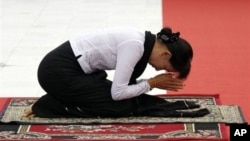BANGKOK -- Burma’s government is commemorating Martyrs' Day, an event marking the assassination of General Aung San, largely regarded as the country's father of independence. For decades the day was not allowed to be observed freely, but on Thursday the reform-minded government held a joint ceremony with opposition lawmakers, including Aung San Suu Kyi, daughter of General Aung San.
The ceremony, which was broadcast on Burmese state television, took place near the Shwe Dagon pagoda, the country's most important Buddhist pilgrimage site.
National League for Democracy (NLD) leader Aung San Suu Kyi delivered a speech at her party's headquarters, where a large crowd gathered to wait in the rain and watch. Party spokesperson Nyan Win says the practice of recognizing Martyrs' Day persisted for years, although opposition members were not allowed to participate openly.
"It's a good sign for the future," he said. "Because we can make a joint celebration, and also we can make a cooperation with other people, other parties and government, it's very significant, I think."
Despite the liberal celebrations in Rangoon, authorities in some other parts of the country were strict about controlling public observances of the occasion. NLD member Ko Ko Zaw, who planned a ceremony in Ye township of Mon state, said local authorities restricted events at a designated area on the basis that it was government property. He also said he had heard of prohibitions on Martyrs' Day ceremonies in other townships.
Aside from events marking Aung San's assassination, Burmese filmmaker and former political prisoner Zarganer said he is hoping to premiere a biopic of the general on what would be his 100th birthday in 2015, an undertaking that would not have been possible in the past.
"According to the military regime since 1962, we didn't get a chance to publish the book for the Bogyoke Aung San, also we didn't get making the movie for the Bogyoke Aung San since 1962," said Zarganer. "Now we got a chance so we try to make that kind of movie."
Recently relaxed censorship laws do not require filmmakers to ask permission to make such a film, and Zarganar says they have an extensive list of people clamoring to volunteer time to the project.
The ceremony, which was broadcast on Burmese state television, took place near the Shwe Dagon pagoda, the country's most important Buddhist pilgrimage site.
National League for Democracy (NLD) leader Aung San Suu Kyi delivered a speech at her party's headquarters, where a large crowd gathered to wait in the rain and watch. Party spokesperson Nyan Win says the practice of recognizing Martyrs' Day persisted for years, although opposition members were not allowed to participate openly.
"It's a good sign for the future," he said. "Because we can make a joint celebration, and also we can make a cooperation with other people, other parties and government, it's very significant, I think."
Despite the liberal celebrations in Rangoon, authorities in some other parts of the country were strict about controlling public observances of the occasion. NLD member Ko Ko Zaw, who planned a ceremony in Ye township of Mon state, said local authorities restricted events at a designated area on the basis that it was government property. He also said he had heard of prohibitions on Martyrs' Day ceremonies in other townships.
Aside from events marking Aung San's assassination, Burmese filmmaker and former political prisoner Zarganer said he is hoping to premiere a biopic of the general on what would be his 100th birthday in 2015, an undertaking that would not have been possible in the past.
"According to the military regime since 1962, we didn't get a chance to publish the book for the Bogyoke Aung San, also we didn't get making the movie for the Bogyoke Aung San since 1962," said Zarganer. "Now we got a chance so we try to make that kind of movie."
Recently relaxed censorship laws do not require filmmakers to ask permission to make such a film, and Zarganar says they have an extensive list of people clamoring to volunteer time to the project.




